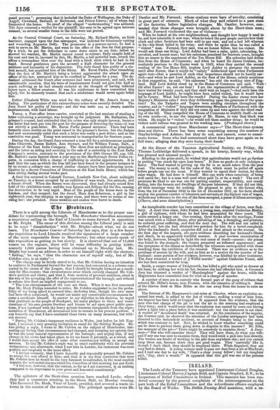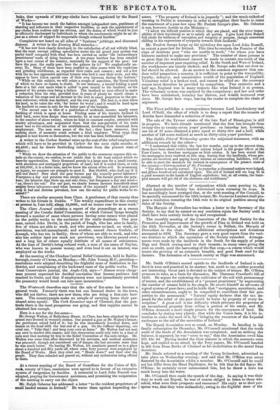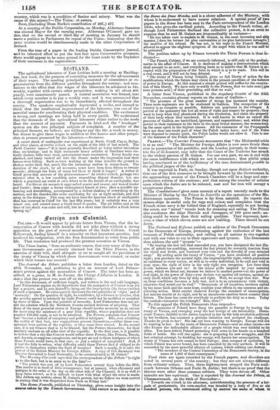• IRELAND.
The Lords of the Treasury have appointed Lieutenant-Colonel Douglas, Lieutenant-Colonel Harvey,Captain Reid, and Captain Stopford, R.N., to be Inspectors of Relief Committees in Ireland. This measure has been ren- dered necessary by the general complaints of the mismanagement on the part both of the Relief Committees and the Subordinate officers employed by the Board of Works. The Dublin Evening Mail mentions, with a re-
bnke, that upwards of 250 pay-clerks have been appointed by the Board of Works-
" It has become too much the fashiont independent men, gentlemen of standing and influence in their respectivean=ties, to seek the appointment of pay-clerks from motives only too obvious, and the duties of which would be just as efficiently discharged by individuals to whom the emoluments might be an ob- ject as a means of support for respectable though reduced families."
Complaints are heard on all sides of " Squireen"jobbings, and shammed distress. A writer in the Evening Mail remarks-
" It has now been clearly developed, to the satisfaction of all not wilfully blind, that the most corrupt jobbing speculation under the old grand jury system was purity itself compared with what has been carried on under the extraordinary presentment' mode of doing business. A ten-years burthen has been entailed upon a vast extent of the country, nominally for the support of the poor: but have the poor, the really poor, been the gainers by it? We emphatically an- swer, No. Many of them have been enabled to clear scores with the rapacious and grinding middleman, as regarded their cabin and conacre ; and not a few with the no less oppressive spiritual tyrants who lord it over their souls, and who appear to have taken special care of their own interests during the hubbub."
" While on this subject, we will relate a couple of anecdotes, the 'literal truth of which we have no reason to doubt. In one instance, a tenant holding a good farm at a fair rent made what is called a_poor month to his landlord, on the ground of his potato crop being a failure. The landlord at once offered to make a reduction from his rent, provided that in years of plenty be would obtain a valuation of his crops and an increase in the rent in exact proportion to the pre- sent reduction; which was declined, and the rent paid. The fact is, a man takes his land, as he takes his wife,' for better for worse'; and it would be bard upon the landlord to come in only for the latter part of the bargain.
"The second case is that of a gentleman of moderate income, nearly every farthing of which is spent at home. Finding some of his tenants inclined to hold back, more from design than necessity, he at once assembled his labourers, to the number of above twenty, whom he kept in constant employ, attended with sundry advantages, and acquainted them that the non-payment of his rents must lead to the reduction of his establishment, involving their dismissal from employment. The men were aware of the fact ; they knew, moreover, that nothing short of necessity could actuate a kind employer. What steps they adopted is best known to themselves, but the rent has been forthcoming."
A writer in the Carlow Sentinel sums up the cost of the relief employment which will have to be provided in Carlow for the next eight months, at 60,4801.; and he draws foreboding inferences from the present state of affairs-
" While we draw the attention of the public to the enormous expense this en- tails on the county, we confess, to our minds that is the least subject which we have for apprehension. Sixty thousand pounds is a large sum for a small county, with absentees and mortgaged proprietors of land; but if it ended there, or even at 100,0001., it is a finite sum, and we know the extent of the evil. In measuring an injury, we measure our strength to meet it. But 60,0001., who shall say if it will end there? How shall the poor farmer pay the scarcely poorer labourer? ' Fourpence a day and potatoes was simple enough. The farmer grows the pota- toes; the labourer digs them up, and eats them; but fourpence a day and meal— '.ay, there's the rub.' For our part, we clearly foresee farmers henceforth must employ fewer labourers—and what becomes of the rejected ? And if next year's crop is bad and distress prevalent, how can the outcry for public works be re- misted? "
There are similar accounts from Clare. A gentleman of that county thus writes to his friends in Dublin. " The weekly expenditure in this county at present is, Iam told, abort 16,0001., and an insane roar for more work."
The Clare Journal contains a report of the proceedings at a recent meeting of the Corolla Relief Committee, at which Colonel Synge brought forward a number of cases where persona having some means were placed on the public works to the exclusion of the really destitute. One poor man, named John Devitt, in the parish of Inagh, who has nine in family, five of whom are able to work, and who possesses no land, no stock, no provisions, was left unemployed; and another, named James Guthrie, of Armagh, who has ten in family, three of whom are able to work, and who also has neither land nor stock nor provisions, was likewise passed over; and a long list of others equally destitute of all means of subsistence. At the time of Devitt's being refused work, a man of the name of Neylan, who was known to possess money, and even lend it out on interest, was employed on the works.
At the meeting of the Clonkee Central Relief Committee, held in Baillie- borough, county of Cavan, on Monday,—Mr. John Young, M.P., presiding— resolutions were adopted describing the frightful state of destitution in the district, and complaining of the backward state of the public works. The local Conservative journal, the Anglo-Celt, says—" Almost every clergy- - man present expressed his decided conviction that human patience had reached its limits, and that if employment were not immediately provided the peasantry would break out into open insurrection."
The Westmeath Guardian says that the sale of fire-arms has become a general trade. Formerly there was but one licensed dealer in the town, who did not thrive; there are now three, who are doing a first-rate busi- ness. The countrypeople make no scruple of carrying home their pur- chased arms openly. The Cork Examiner says of Clonmel, that the gun- trade there is the most prosperous one going, and that supplies cannot be obtained fast enough.
Here is a use for the fire-arms- Mr. George Walton, of Ballysheen House, in Clare, has been attacked by three armed men dressed in women's clothes. One pointed agun at Mr. Walton's breast: the gentleman seized hold of it; but he was immediately knocked down, and beaten on the head with the bat-end of a gun. On the ruffians' departing, one cried out, " Take that! and keep your corn at home." Mr. Walton had not sent any corn to market this season; and this observation could only refer to a load of corn sent that morning by bim to the Relief Committee of Six-mile-bridge. Mr. Walton was some time after discovered by his servants, and medical assistance was procured: though not considered out of danger, the last accounts state that he was much better. On leaving Mr. Walton, his assailants passed on to a place about a hundred and fifty yards off, where some forty persons were employed by the Board of Works. Here they cried out, " Heads down!" and fired over the people. They then reloaded and passed on, without any molestation being offered to them.
At a recent meeting of the Board of Guardians for the Union of Mi- ra* county of Clam, resolutions were agreed to in favour of an extensive system of emigration by families. A memorial to Lord John Russell was adopted, praying for Government assistance, and promising the cooperation - of the meeting to carry out the object.
Mr. Ralph Osborne has addressed a letter "to the resident proprietors of small landed estates in Ireland." He warns them against impending dis- asters. "The property of Ireland is in jeopardy."; and the much-talked-of meeting in Dublin is n. teetary in order to strengthen their hands to resist the enactment of a poor-law upon Mr. Poulett Scrope's plan. Mr. Osborne is not, however, hostile to the Ministry—
"I admit the difficult position in which they are placed, and the utter impos- sibility of their legislating so as to satisfy all parties. I give Lord John Russell full credit for boldness of conception and integrity of purpose, though somewhat chilling in his expressions of sympathy towards Irish landlords."
Mr. Poulett Scrope keeps up his epistolary fire upon Lord John Russell, to extort a poor-law for Ireland. This time he reminds the Premier of the class of destitute poor "who are unable to work," "for whom you have hitherto omitted to make any provision." The number of these persons is so great that the workhouses cannot be made to contain one-tenth of, the number of impotent poor requiring relief. In the South and West of Ireland, the workhouses are utterly choked; and Mr. Scrope asks that out-door re- lief should be allowed. As an answer to the common argument that out- door relief pauperizes a country, it is sufficient to point to the tranquillity, loyalty, industry, and comparative wealth of the population of England. Voluntary relief is a broken reed, and cannot be relied on: the necessary means must therefore be provided by compulsion. Two centuries and a half ago, England was in many respects like what Ireland is at present. The voluntary system was replaced by the compulsory; and law and order have been maintained, industry has thriven, and wealth increased ever since. Mr. Scrope here stops, leaving the reader to complete the chain of argument.
The Times publishes a correspondence between Lord Londonderry and Lord O'Neill, the effect of which is to deny a report that the tenants of Antrim have demanded a reduction of rents.
The sale of the Tyrone estates of the late Earl of Blessington 'is dill in progress. We have already mentioned that the first lots brought from twenty-five to twenty-seven years' purchase: on Saturday last, however, one lot of 37 acres obtained a price equal to thirty-five and a half, while another of 129 acres realized as much as thirty-nine years' purchase.
The Dublin Pilot of Wednesday quotes the subjoined statement, with an additional remark by the editor- "' I understand that within the last few months, and up to the present time, there have been about twelve hundred notices lodged in the proper offices at the -Four Courts, to foreclose mortgages on Irish estates. It has been stated that the mortgagees have resolved on this step, fearing that the landlords, whose pro- wties are involved, and paying heavy interest on outstanding liabilities, will not be able to meet the demands for interest in consequence of the present state of the country Correspondent of the Freeman.'
" The above is nearly correct. Up to yesterday a thousand notices were lodged, and fifteen hundred are calculated upon. The soil of Ireland will ere long be is a good measure in the hands of English capitalists; but, at all events, the tram- pled tenants will get rid of the shoneens and middlemen."
Alarmed at the number of resignationa which came pouring in, the Royal Agricultural Society has determined upon retracing its steps. It has accordingly been arranged that, at the next meeting of the Council, to be specially summoned for the 12th instant, Mr. Gustavus Lambert shall pro- pose a resolution restoring the 14th rule to its original position among the rides of the Society.
The Marquis of Downshire has written a letter to the Secretary of the Society, to say that he cannot on any condition rejoin the Society until it shall have been entirely broken up and reorganized.
The monthly meeting of the Committee of the Royal Society for the Promotion and Improvement of the growth of Flax in Ireland was held on the 25th November, at the Society's rooms in Belfast; the Marquis of Downshire in the chair. The additional subscriptions and donations amounted to 319/. The Secretary gave a very good report from the vari- ous districts to which the operations of the Society extended. Arrange- ments were made by the landlords in the South for the supply of prime Riga and Dutch sowing-seed to their tenants; in many cases giving the seed on credit, until the harvesting of the flax crop,—a course which would insure the growing of an extensive breadth, and good fresh seed for the farmers. The formation of a branch society at Sligo was announced,
Mr. Smith O'Brien's second epistle to the landlords of Ireland is sub- dued in tone and practical in its matter; but, sooth to say, neither powerful nor interesting. Great part is devoted to the subject of tenure. Mr. O'Brien proposes to take, as a basis for discussion, Mr. Sharman Crawford's bill of 1845. He argues for endowing the cultivator of the soil with permanency of tenure, and the establishment of a "peasant proprietary " by augmenting the number of estates held in fee-simple. He avows himself an advocate of a good system of poor-laws; and he holds that " mortgagees, annuitants, and other encumbrancers, ought to be compelled to contribute their fair pro- portion to the assessment." " Natural equity declares that the tax im- posed for the relief of the poor should be borne by property of every de- scription." A great evil is the difficulty which prevents the proprietor of an encumbered property from selling a portion of his estate, and Mr. O'Brien demands a more simple process for the conveyance of land. fle concludes by stating very plainly, that while the Union lasts, it is his in- tention to make the most of it, by "bringing the resources of the Imperial exchequer to the aid of the necessities of Ireland."
The Repeal Association met as usual, on Monday. In handing in his family subscription for December, Mr. O'Connell mentioned that the tenth audit of the funds of the Association was completed; and on striking the balance, it appeared, he was " sorry to say," that the Association owed him 97/. 10s. 9d Having lauded the clear manner in which the accounts were kept, and replied to an attack by the Tory papers, Mr. O'Connell handed in 201. from Dean Burke of Clonmel as his contribution to the moral force doctrines.
Mr. Steele referred to a meeting of the Young Irelsnders, advertised to take place on Wednesday evening; and said that Mr. O'Brien was never flattered by the Association whilst a member. Mr. O'Connell said he could not but differ from the Head Pacificator, for he felt that he did flatter Mr. O'Brien: he certainly never calumniated him, but he threw a little toe much honey into the water.
Mr. O'Connell then made the speech of the day. In saying it was their duty to work out Repeal, he was of course obliged to listen to those who asked, what were their prospects and resources? His reply as to their pro- spects was, that they were melancholy, owing to the frightful state of the country, which was in a condition of famine and misery. What was the came of this misery?—The Union: et =term Rent, (including Dean Burke's contribution of 20/.,) 471.
At a meeting of the Dublin Corporation, on Monday, Alderman Staunton was elected Mayor for the ensuing year. Alderman O'Connell gave no- tice, that on the second or third day of meeting in January he should move a petition to Parliament for repeal of the Union; intimating that the same motion would be simultaneously made in the other Corporations of Ireland.
From the tone of a paper in the leading Dublin Conservative journal, and its laboured effort to put the best face upon Conservative prospects, there would appear to be some ground for the boast made by the Repeaters of their successes in the registrations.




































 Previous page
Previous page